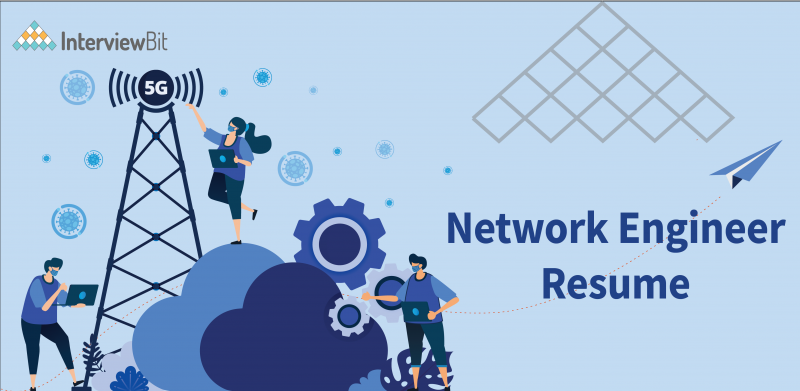Introduction
In today’s world, with more and more workforce adopting digital technology, nearly every field is overhauling its ability to operate online and use the latest technologies to stay competitive. Due to the advent of technology, network engineers have become highly sought-after professionals, and there are many new and exciting career opportunities available within this growing profession. The US Bureau of Labor Statistics projects that employment for network engineers will increase by 4% between 2019 and 2029.
A career in network engineering requires a solid understanding of network integration, infrastructure, and programming. Furthermore, you should be a creative problem solver and an excellent communicator. But, the question is how can you convince recruiters/hiring teams before your work is seen?
You can impress or convince the recruiter with a stellar network engineer resume sample. Writing an attention-grabbing resume will help you get the job you want. Yet, the question is how do you show off your network engineering skills on your resume and make yourself more attractive to potential employers?
Confused about your next job?
Here’s an example of a network engineer resume that you can use to boost your chances of being hired. We will teach you how to incorporate these skills into your own resume so that your application can stand out in this highly competitive job market.
First, let’s understand what a network engineer actually is.
What is a Network Engineer?
In order to conduct their daily operations, most businesses use telephones, the internet, computers, and other systems. Almost all modern companies rely heavily on their IT infrastructure to function. A network engineer, also known as a network architect, is a highly skilled professional who designs, builds, and manages integrated networks of these technologies, ensuring that they run as smoothly as possible.
Technology professionals such as network engineers are trained in the maintenance of networks, including data transmission, voice calls, video transmission, and wireless network service. A network engineer is an essential part of the IT team. He or she understands the overall workings of the network, as well as the necessary hardware and software tools for a rapid, secure, efficient, and safe connection between different areas.
As network technicians or IT administrators take care of IT issues and troubleshoot issues on a daily basis, network engineers are engaged with designing and improving networks. Typically, network engineers are responsible for supporting computer systems, installing equipment (such as switches or routers), backing up data, and updating software. It may be their responsibility also to set up and maintain a physical and wireless network, search and integrate new technologies to enhance network performance.
A network engineer’s goal is to ensure the quality, security, and high availability of network infrastructure to ensure maximum performance for users. In this field, you may work internally for an organization’s IT department or externally, for a company offering IT networking consulting services to a number of clients.
Importance of Network Engineer resume
In a resume, you summarize your expertise and relevant work experience in a professional manner. In spite of the high demand for network engineering jobs, you still need to make sure that your resume reflects the qualifications recruiters are looking for.
The way you write your resume must convey your personality and demonstrate your skill as a Network Engineer. It’s vital to highlight relevant certifications, your industry experience, and include first-hand numbers about your successes without forgetting to include your industry-relevant skills. A great resume balances explaining your background with letting your achievements speak for themselves.
Creating a network engineer resume that stands out is no easy task. But don’t worry, we are here to guide you!
In this article, you will discover everything you need to succeed at your next network engineer interview. Throughout this article, you will learn who is a network engineer, its importance, and how to create a great network engineer resume. Furthermore, we have included a comprehensive resume template for your convenience. Let’s get started!!!
Network Engineer Resume
Resumes can either make or break your chances of landing a full-stack developer job. Additionally, a great resume can make you stand out among other job candidates, and recruiters will be more likely to hire you. The following sections will help you create a standout network engineer resume:
Create a header
In any resume, the first thing a recruiter will see is the header, so be sure to keep it short, clear, and straightforward. All of the information should be easily accessible, color-coordinated, titled, yet also self-explanatory. Ideally, a resume header should accomplish two things:
- Makes a recruiter feel like you’re a good match for the position
- Makes it easy for them to contact you
In most cases, resumes are sent with a variety of header styles. In some resumes, the header can be as long as half the page, and in others, it only contains the name of the candidate. Make your resume header informative, including the following components:
Critical Details:
- Name
- Address
- Contact Information (Email and Phone number)
- Github/Personal Blog/Portfolio/Linkedin profile Link
- Network.stackexchange.com/stackoverflow.com
In order for recruiters to contact you for an interview, you must provide all of these details. These details, though seemingly insignificant, can help you reach out to the right employer. You’ll be able to give your recruiter a better picture of your abilities and expertise this way. The following network engineer resume samples demonstrate the difference between the right and the wrong format of the header section:
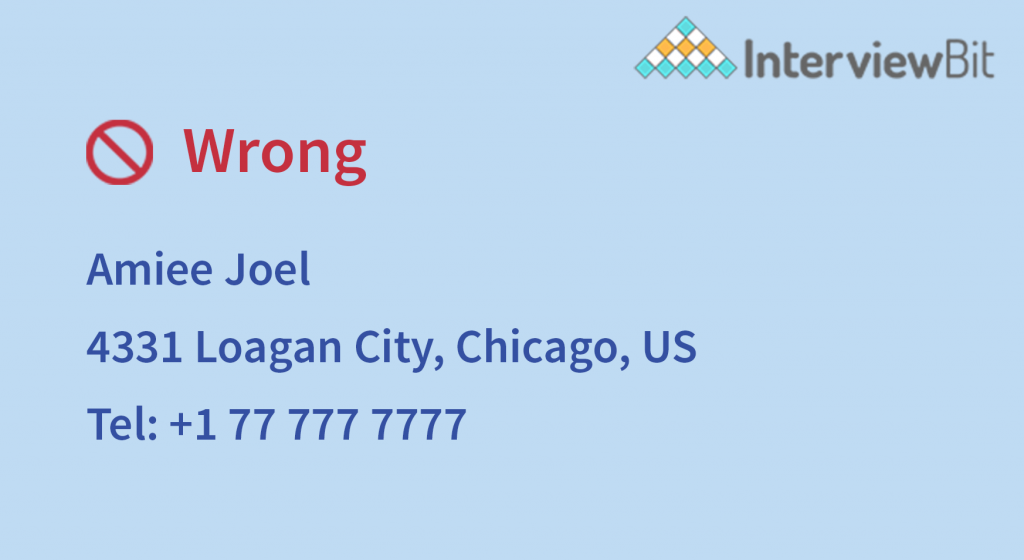
Note: You can give employers a glimpse into who you are by linking to your personal blog or portfolio. Lack of a professional email id is also not advisable.
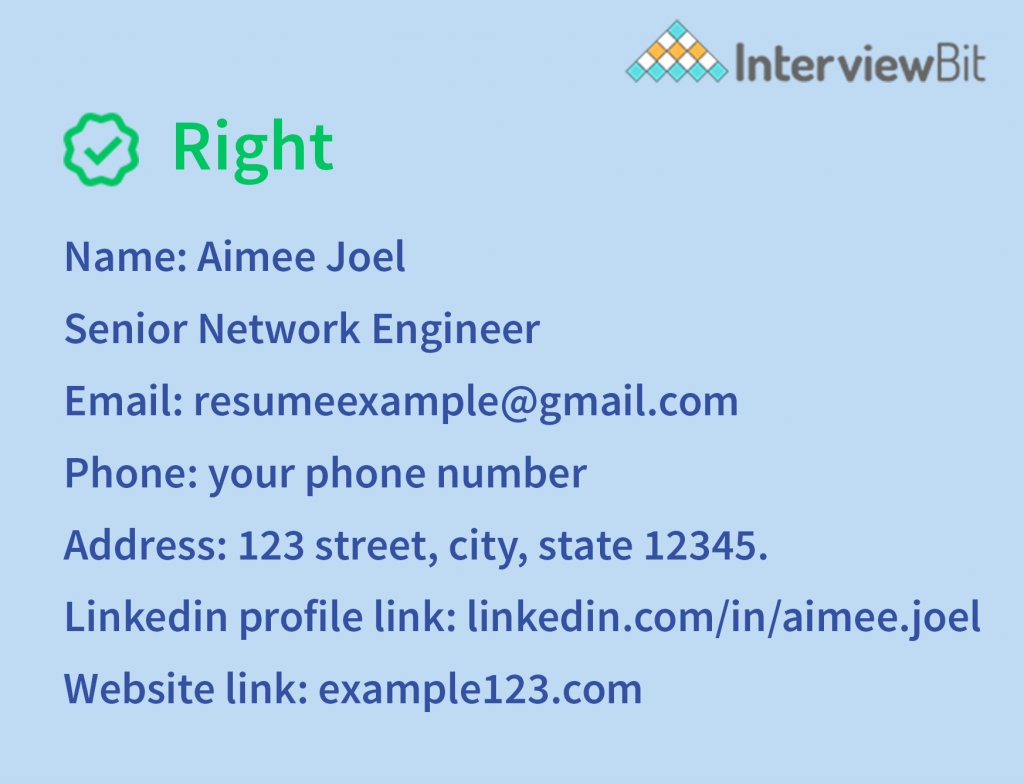
Write a Professional/Effective Resume Summary
An important part of creating a resume is writing a professional summary. By crafting an effective summary, you will put yourself far ahead of the competition. Choosing the right words convinces hiring managers that you can contribute measurable value to their company. In your resume, emphasis should be placed on how you have grown and learned new technologies over the course of your professional career. If you cut down a resume summary to a maximum of two-three lines, there is now a lot more space available for you to place highly valuable information. A resume summary must include the following information:
- Years of experience
- An overview of the skillsets (Network automation, IoT, Cybersecurity, etc.)
- Technology used in previous positions (if any)
- Network Engineer achievements
The following network engineer resume samples demonstrate the difference between the right and the wrong format of Summary:

Note: Observe the use of the words “strong background” and “specialists.”. Aren’t these the same words? The description seems rather generic and anyone could use it.

Write Professional Experience
The secret is here. It is the professional experience that will propel a network engineer’s resume straight to the top of the pile. You can showcase your professional experience in a network engineering resume to show the recruiter you are the person they are looking for. The average resume is one page long, however, for every 5+ of experience, you can add another page. It’s not only your experience that counts; your effort in explaining your career path is as well.
Describe the main responsibilities of each position, emphasizing those relevant to network engineering. You should also list specific projects you have completed and methods you used to achieve those results. The practical experience will prove to prospective employers that you possess the skills they seek. In turn, this builds the recruiter’s confidence in you and helps you get the interview. The following network engineer resume samples demonstrate the difference between the right and the wrong format of the professional experience section:
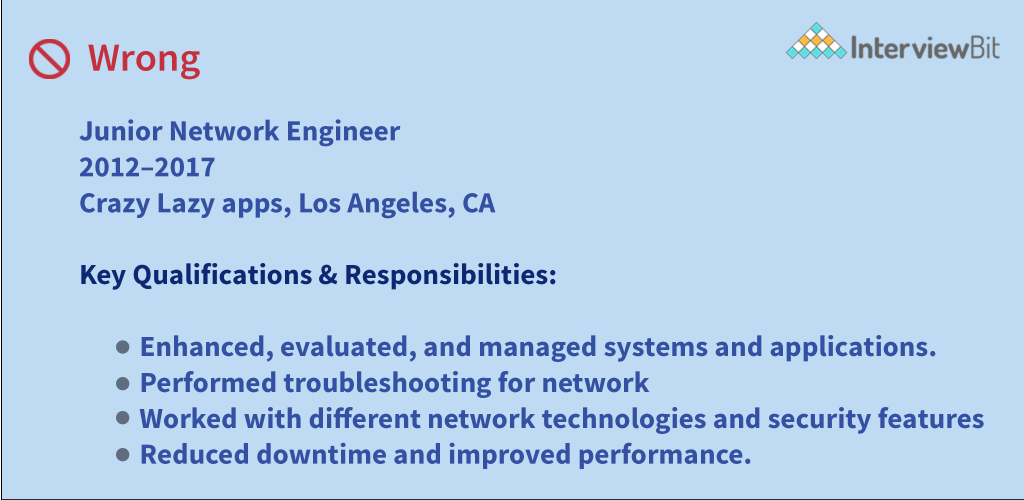
Note: Several issues plague this resume experience. If you have only four or fewer bullets on your network engineer experience list, recruiters might think you have inadequate experience. Also, recruiters may think the candidate did not put any effort into listing their achievements. By default, vague resumes look low quality to recruiters and are a big turnoff.
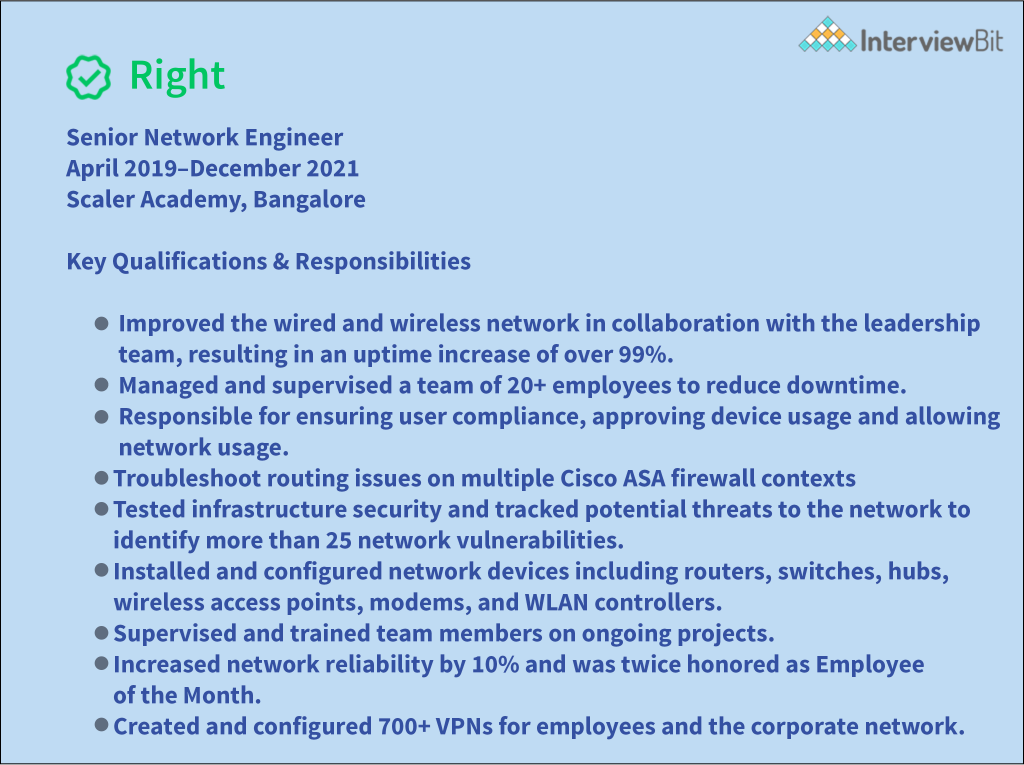
Junior Network Engineer
January 2014–March 2019
Bajaj Finserv, Pune
Key Qualifications & Responsibilities
- Over 110 network devices across 10 locations were monitored using the SMNP solution.
- Developed 15 secure networks, including local and wide-area networks.
- Secure data, software, and hardware using effective security measures.
- Solved load balancing issues, resulting in 20% less downtime.
- Improved project management skills to reduce delivery times by 20%.
- Assist in the implementation and maintenance of layer 2 and 3 network services, such as VLAM and STP.
- Implement and maintain firewalls from various vendors, including next-generation features and site-to-site VPNs
Write Educational Section
Different companies in the market require different levels of education. For most open roles in network engineering, a bachelor’s degree in science, technology, engineering, or mathematics (STEM) is required. There are some companies that will make an exception, allowing applicants with an associate’s degree or three-four years of relevant job experience entrance. However, you can be hired by some companies while you’re still in high school or as a student. No matter what your academic background is, it is still important to optimize the education section on your resume for maximum impact. The following network engineer resume samples demonstrate the difference between the right and the wrong format of the education section:
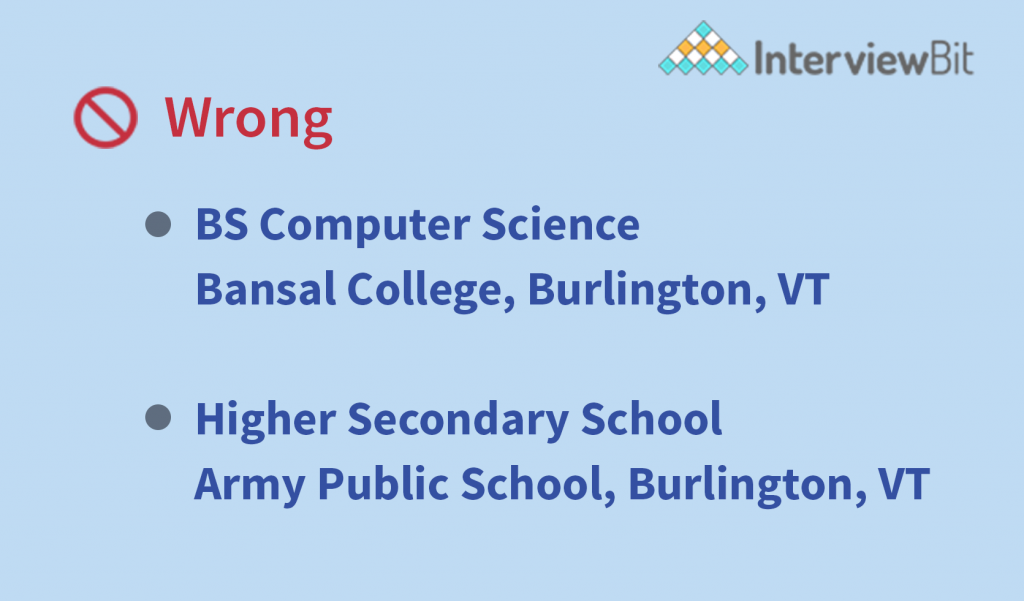
Note: For those who have completed their college degree, they do not have to enter high school unless they have relevant skills to add. If you took classes relevant to network engineering, be sure to mention them to prove that you’re the ideal candidate. Mention any other academic accomplishments that will help you in your cause, such as honors you’ve received, extracurricular activities in which you participated, and student organizations you were involved in. A degree should be placed at the top, followed by the college’s name and location. Next, add the date of completion.
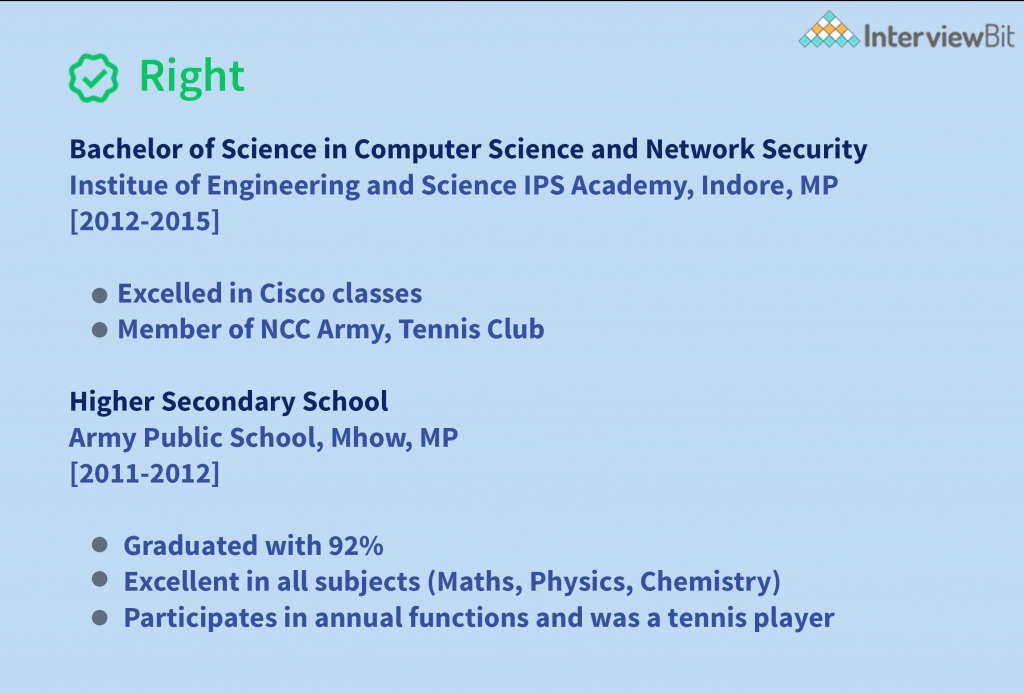
Write your Network Engineer skills
Hiring managers/Recruiters don’t have time to look over each resume individually. Instead, they utilize tools that help them search through submissions. Your resume will be scanned for skills their company needs, such as skills in network engineering like “TCP/IP” or “Java.” Incorporate more resume keywords (network engineering skills) into your resume, and the more likely it is to be read by recruiters. Start by thinking about industry-leading skills and avoid generic skills when writing a resume. The following full stack resume samples demonstrate the difference between the right and the wrong format of the skills section:
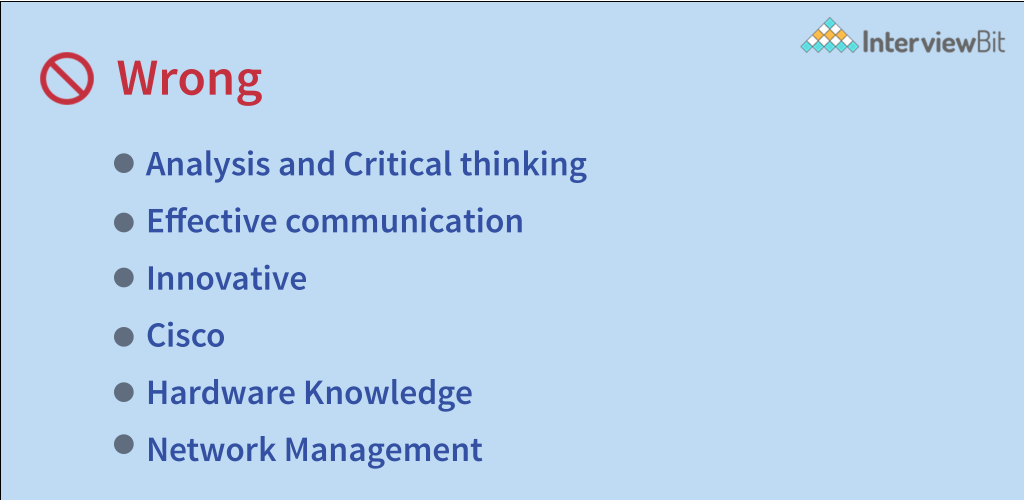
Note: If you include generic skills and knowledge, your employer will not be confident that you have the skills and knowledge needed. Use industry-specific skills instead. It is also not a good idea to lie on a resume. Listing skills you haven’t acquired will not impress employers.
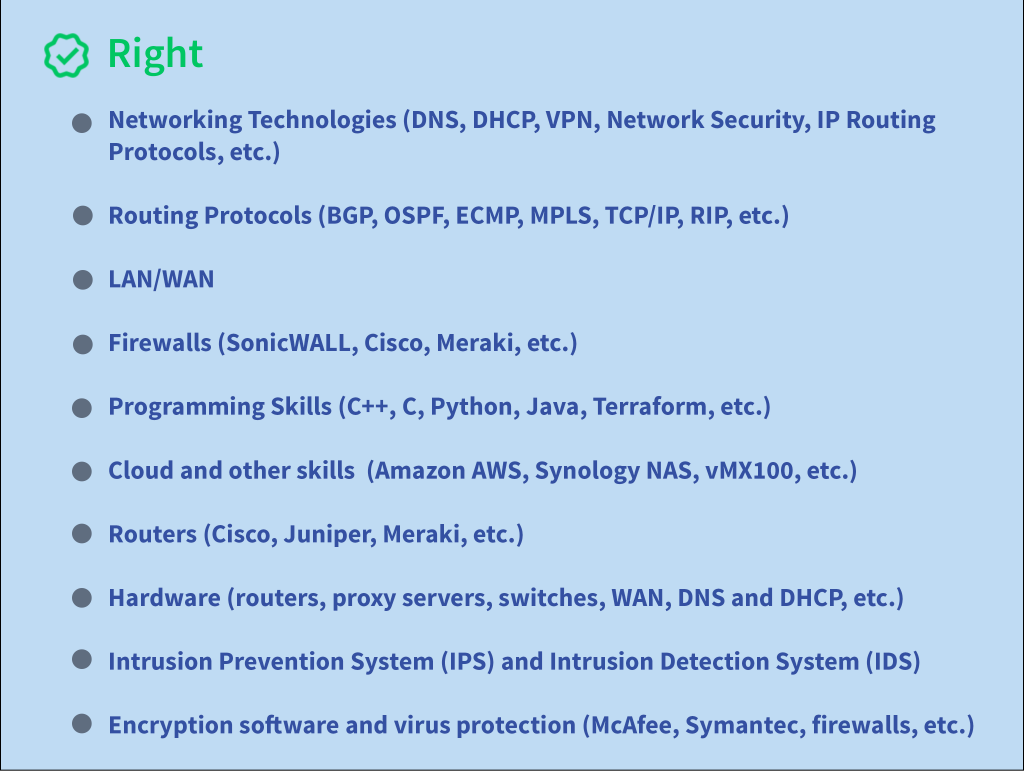
Other Sections
A resume is a presentation layer since an employer is the end-user. With more professional experience as a network engineer, your interests, hobbies, languages begin to have less impact on your resume. If you are an intern, a recent graduate, or in an entry-level position, demonstrating proactive applications of your knowledge can be seen as a sign of initiative. Consider adding a few extra sections to your network engineer resume if you want it to be highly rated. The most common ones are the following:
Achievements
When writing a network engineer resume, emphasize your achievements from previous jobs and careers. You can further illustrate your accomplishments by including hard numbers on your resume. A professional accomplishment indicates to a prospective employer that you are driven to excel in your position.
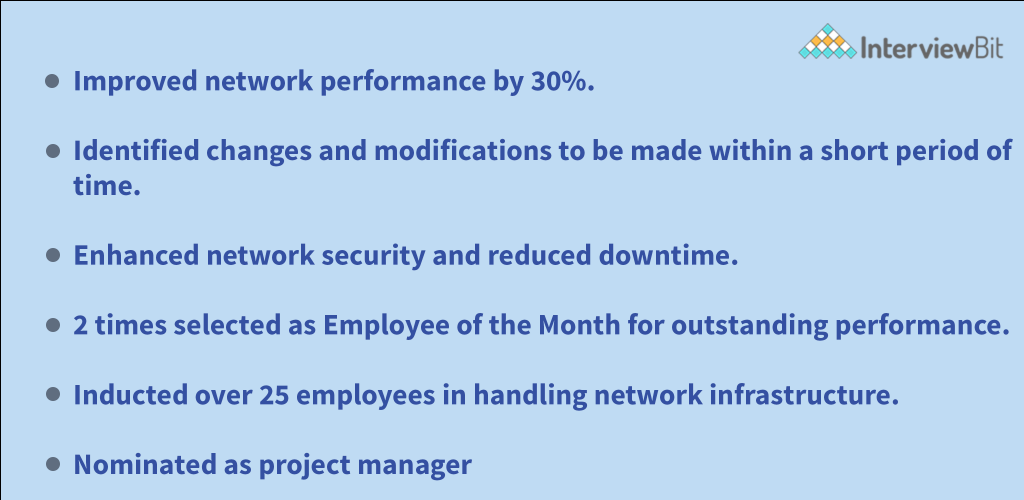
Certifications
Earning a certification can be a great way to show your dedication and drive to develop your career. Employers may also demand industry certifications, such as Cisco Certified Network Associate (CCNA), CCNA Routing and Switching Certification (CCNA RS), and others. When you include certifications on your resume, you will give yourself an edge over other job applicants.
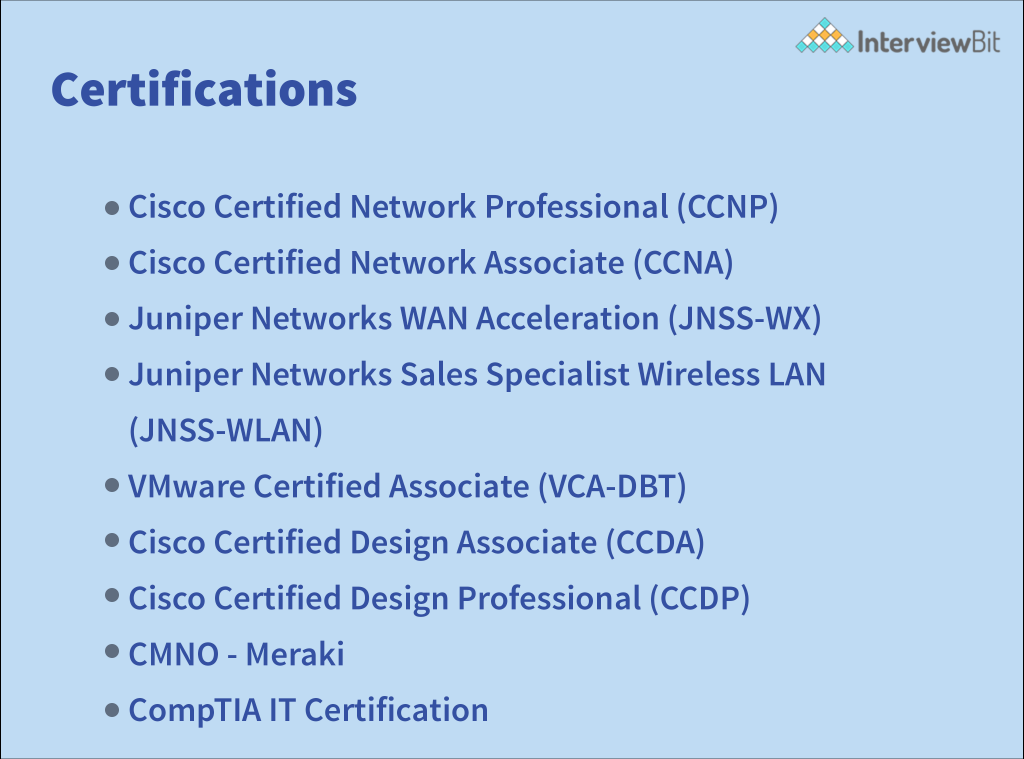
Foreign languages
Having proficiency in multiple languages opens up a range of career options. Speaking a foreign language fluently, however, is your best bet. Not only does it provide job security, but it can also open the door to advancement and higher wages.
Hobbies and interests
Interests and hobbies demonstrate to an employer that you are a well-rounded individual with an excellent work ethic. You can demonstrate how you will fit into the company’s culture by listing your hobbies/interests. It should demonstrate your personality and be relevant to the job at hand at the same time.
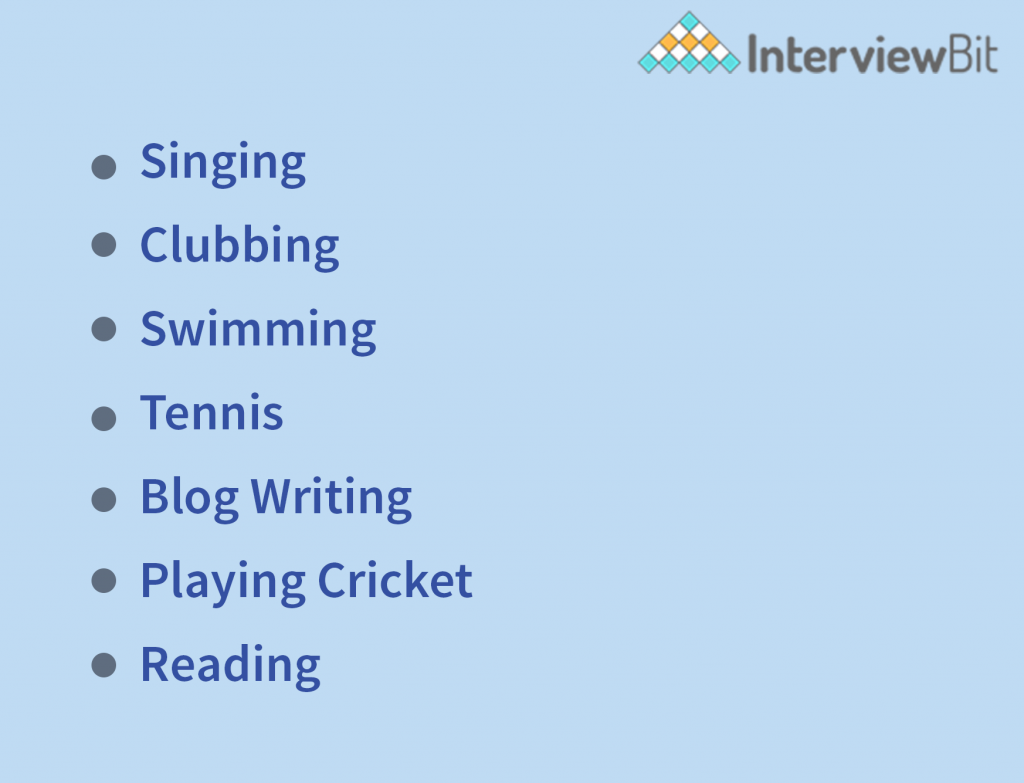
Listing volunteer work
Adding a section about volunteer work might also be helpful. Including volunteer work on your resume allows employers to see what you’re interested in and what you can do. Even if you have no professional experience, volunteer work can strengthen your resume. Furthermore, it is an effective method of showcasing your professional skills, as well as demonstrating your desire to serve.
Having these sections at your fingertips means that there is no need to adhere to any specific guidelines. There is some leeway here. Additionally, you can describe a particular project you completed or the reason you were recognized.

Note: Many people don’t give much thought to these sections of resumes and simply fill them out. Make sure the information you provide here is accurate and relevant to you. If you are creative and innovative, you will easily stand out from the crowd.
Conclusion
Employers can quickly assess your suitability for a job by reviewing your resume. Employers need information about your skills, professional experience, education, certifications, achievements, and other details to determine whether you will be an asset to the organization.
We have discussed a lot!
By now, you should be able to get a call for an interview. No matter how much experience you have, there is always a way to tailor your resume to stand out from the competitors. The following are a few dos and don’ts to keep in mind when writing a resume. You will have no trouble writing a resume if you follow these tips.
Do’s
- Don’t use standard phrases on your resume. Your resume should be concise with pertinent bullet points. Make sure your sentences are short and succinct and avoid using verbose ones.
- Prior to writing a resume, determine your job search objectives and tailor it or customize it to fit the job description. Include key industry terms. Create different versions of your resume for each position you apply for.
- Consider quantifying your experiences whenever possible and include figures and percentages if possible.
- Do not elaborate on every detail, but rather emphasize specific accomplishments. Showcase your abilities using data and statistics. A simple number can impact the decision-making process.
- A summary is like an “elevator pitch.” It should briefly summarize your key qualifications and accomplishments. An effective summary is like an elevator pitch, in which you briefly describe your work accomplishments and abilities.
Don’t’s
- Do not include Microsoft Word skills, communication skills, interactive skills, etc. Since, you are expected to be familiar with Microsoft Word and the internet. Highlight skills that actually set you apart on your resume.
- Avoid making your resume too long. Do not include mundane day-to-day responsibilities or irrelevant duties on your resume. Use short, punchy bullet points and phrases and highlight only relevant qualifications and achievements. Keep it to two pages or less.
- Do not forget to proofread your resume before you hit SEND. Any mistake on a resume is a recruiter’s pet peeve—no matter how small. The resume must be accurate, relevant, and free of spelling, grammar, and formatting errors.
FAQs
Q. What are the skills of a network engineer?
A. To be a successful network engineer, one must possess a variety of skills, from computer and technical expertise to teamwork and the ability to communicate with others. Some of the network engineer skills include programming skills (C++, C, Python, Java, Terraform, etc.), cloud and other skills (Amazon AWS, Synology NAS, vMX100, etc.), networking technologies (DNS, DHCP, VPN, Network Security, IP Routing Protocols, etc.), etc.
Q. What is a Profile Summary for a network engineer?
A. Having an attractive resume summary is just as important as dressing sharply for an interview. The network engineer’s summary should both reflect their professional expertise and their personality. It should captivate recruiters.
Q. How much does a network engineer make?
A. The demand for network engineers is very high, and there are not enough qualified individuals, so salary, job prospects, and opportunities are excellent. Network Engineers in India earn an average of ₹4,25,000 per year.
Q. How can I improve my network engineer CV?
A. To create a strong resume, many factors must be considered. Here is some advice on how to improve your network engineer resume:
- Discover which resume format is best suited for a Network Engineer.
- Create a compelling summary or objective for a Network Engineer resume.
- Give a detailed description of your past experiences as a Network Engineer (if any).
- Make sure your Network Engineer Resume Education Section shines.
- Showcase your industry-leading network engineering skills (not generic skills) on your resume.
- Add other sections to your resume (achievements, certifications, languages, volunteer work, etc.).


